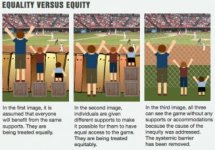Jaw
It's OVER 5,000!
Nailed it! So let's follow that logic with a multiple-choice game. Black and Hispanic people have less money than white people because:
A) They are stupid.
B) They don't work hard.
C) White people are more skilled.
D) We live in a country where white people have historically controlled all of the wealth and power, and we haven't come close to unraveling the systemic issues that arise from a history of inequality.
Appalachia is historically and currently economically disadvantaged. Do you think that's because:
A) They are stupid.
B) They don't work hard.
C) Urban people are more skilled.
D) We live in a country where city people have historically controlled all of the wealth and power, and we haven't come close to unraveling the systemic issues that arise from a history of inequality.

